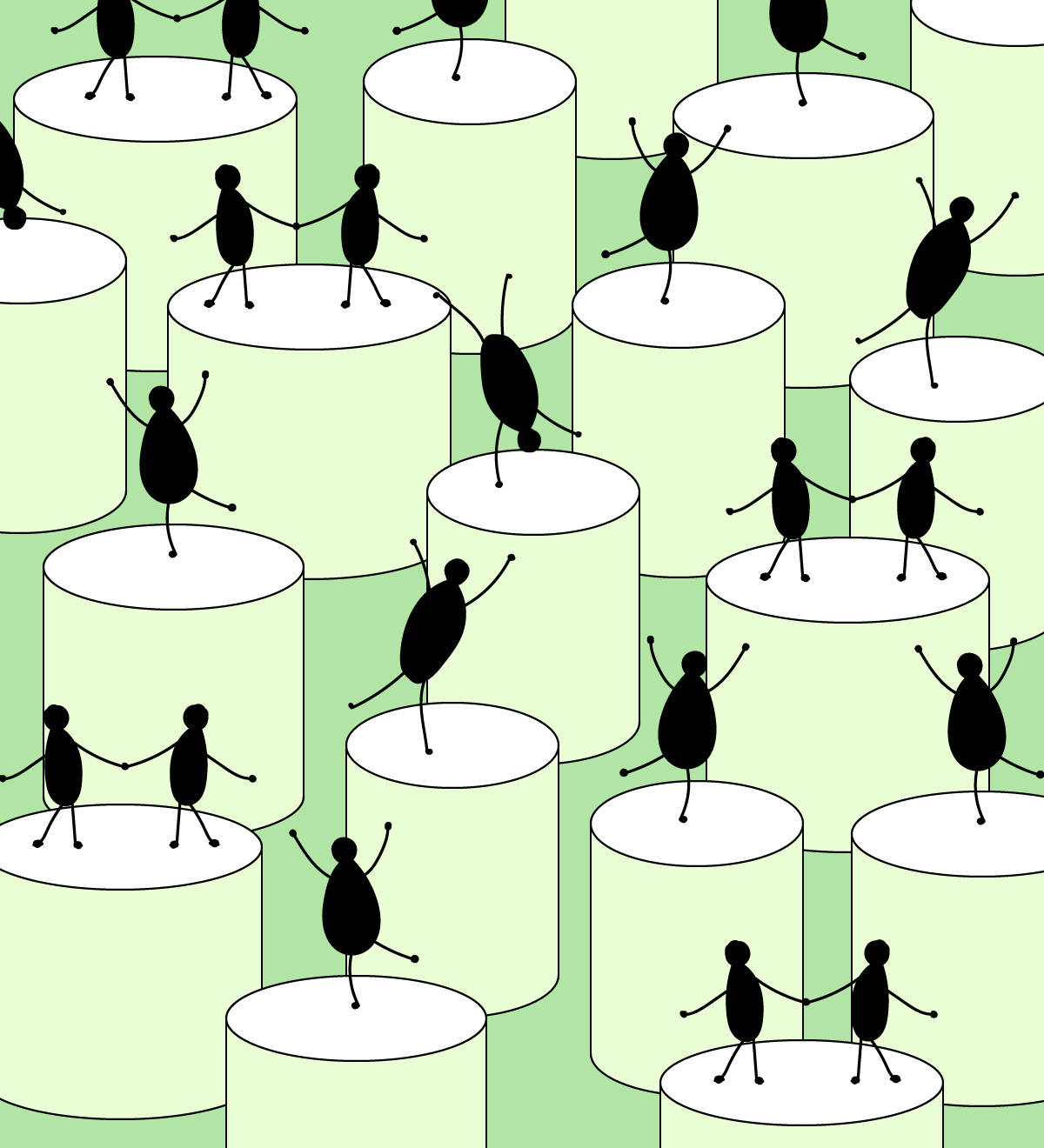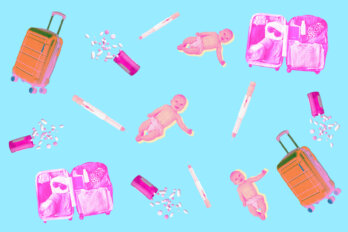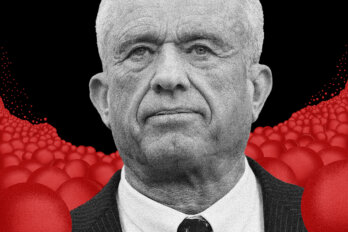In the days following the shutdown, muscular bodies filled my neighbourhood park. People crab-walked across the cricket pitch, lifted enormous kettlebell weights in the grass, and turned the cages of the small baseball diamonds into chin-up bars. (Locals had so much trouble avoiding the actual chin-up bars that temporary fences needed to be erected around them.) One day, I saw a man dragging an enormous tire across the soccer field, a small blond woman sitting on top of it for extra weight.
None of this was a surprise. I live in Vancouver, birthplace of Lululemon, filming location of superhero TV shows, and home of the Grouse Grind, a mountainside staircase that exists, as far as I can tell, solely to provide bragging rights for those who’ve climbed it. But, after the gyms closed, the carved and sculpted hulks I share this city with seemed desperate for a place to continue pummelling themselves into idealized shapes.
I find this fanatical devotion to extreme fitness in the middle of a pandemic surreal. Despite gentle shifts toward fat acceptance in the last few years, it’s clear our culture remains obsessed with controlling our bodies. I see this as I scroll through pictures of beautiful fat women on Instagram, my feed peppered with ads for diet systems that want to help me lose “just a few stubborn pounds,” exercise regimes that will blast my glutes, or shapewear promising to hide my fleshy rolls. In one breath, we claim to celebrate all bodies, and in the next, we are desperate to change them.
Even as the world reexamines so much of what we assumed to be normal before the pandemic, we stay attached to the idea that it is our moral duty to watch our weight. This dynamic was particularly visible on social media in the early days of the lockdown, as people bristled about the possibility of weight gain from the mix of stress eating and lack of activity. “Call it the ‘COVID-19 pounds’” joked one CBC article that ended with a stern warning from a doctor about the chronic health problems he saw “waiting in the wings.” Diet companies, sensing their moment, filled my Twitter feed with exhortations to continue the weight-loss journey. Articles appeared touting unfounded claims that certain diets would boost your immune system and protect you from getting sick. WW, formerly known as Weight Watchers, began offering remote meetings, while Noom, a popular food-tracking app, put out a press release promising to be “your constant amidst the chaos.”
These patterns have remained in the months that followed. At the end of July, UK prime minister Boris Johnson, having discovered exercise after his own bout with COVID-19, announced that weight loss would be a key part of his government’s planning for a possible second wave. Some in the UK have even gone so far as to suggest weighing children at the beginning and end of the school year to see whether they are able to drop any weight they gained during isolation. When I met with a friend for a socially distanced coffee, the week before Johnson’s announcement, she began by apologizing for how much weight she’d gained since we’d last seen each other, in March. Everyone else she’d seen had told her so.
I have no idea whether I’ve gained weight since the world shut down because I haven’t weighed myself in years. It was a decision I made long before the pandemic, but it wasn’t an easy one, and I haven’t done it alone.
I’ve been embroiled in diet culture my whole life. It was my inheritance, both figuratively and literally. In the jewellery box I got from my maternal grandmother after she died was a charm bracelet she wore on special occasions. Among the tiny silver plaques celebrating wedding anniversaries and Mother’s Days, there were several charms from TOPS—Take Off Pounds Sensibly—a weight-loss support program she had belonged to for many years. One of the charms was in the shape of a bathroom scale, with the words “TOO FAT” where the numbers should be. My grandmother had survived polio as a child and the decades of pain that followed. She had raised five children and fostered several more, and she could whip up fresh bread on a dime. But she could never celebrate her body’s marvelous strength because she wore the words TOO FAT as a symbol of shame.
Poor and working-class women, like those in my family, were often encouraged to look to their weight as the source of their problems rather than the larger forces of structural issues like misogyny and capitalism. If you had trouble finding a job or your husband was cheating on you, getting skinny was supposed to be the answer. Meanwhile, weight-loss programs like TOPS and Weight Watchers offered them a community where they could bond over their shared frustrations and trade recipes for zero-calorie whipped-cream desserts they might be able to trick their husbands into eating. Through these rituals, women who had very little agency in their lives were given an illusory sense of control over their own bodies and circumstances. When they failed, as they mostly did, it reinscribed the shame of living in a fat body.
The words—TOO FAT—travelled down the line to me. I carried them in my head and wrote them in my diary alongside grandiose plans to exercise more and mournful diatribes about my food addiction. So much of my teenage life felt out of control, but if I could just make myself skinny, I believed, everything else would fall into place. I first went to Weight Watchers when I was fourteen, after a doctor told me I should consider losing weight. There, I learned the importance of fending off my own treacherous impulses. Food, I discovered, was not about sustenance or enjoyment. Instead, it was an attack from the enemy encampment. Victory resided in one thing only: diminishing numbers on the scale. I didn’t have the money to stick with it for long, but the lessons stayed in my head.
In my twenties, I returned to Weight Watchers, determined to find that elusive success. I came as close as anyone can. I followed the rules to the letter. I gave up beer for vodka and soda. I replaced food with cigarettes and fat-free, sugar-free lattes. I weighed everything I ate, down to the milligram, on a kitchen scale, and what I couldn’t measure, I learned to eyeball—one serving of cheese is roughly the size of a six-sided die; one serving of meat is about the size of a pack of playing cards. I recorded it all faithfully in journals, turning the numbers into points, seeing how little I could eat in a day and how many points I could earn back at the gym. Sure, I felt dizzy sometimes, and my stomach had a nasty way of digesting itself, but who cared? It was working.
I learned strategies for making the most of the weigh-in that happened at the beginning of each weekly meeting. Pee beforehand to knock a few ounces off. Wear your lightest clothes—no jeans—and take off bulky items. These tricks could be the difference between getting a celebratory sticker or a pitying frown from the staff member who recorded your numbers. It worked for a while, but no matter how thin I got, the shame and the desire to lose more never disappeared. And that kind of constant vigilance takes up brain space. When I graduated from university and moved abroad, I could no longer maintain that all-encompassing focus on what passed my lips. The moment my attention wandered away from the program, the pounds began to slink back.
My first taste of not weighing myself came while living in Japan, where the scales were all in kilograms. Having been raised with the metric system, I should have been able to make sense of it, but the language of weight loss from my youth was American. The conversion never made sense, so I stopped trying. But, even without the scale, the shame remained. Among friends, I ate huge, multicourse meals, but I still measured what I ate on my own and curbed the hunger with gallons of iced green tea. When a coworker noticed that I often got into small accidents, she taught me the Japanese word occhokochoi—clumsy, birdbrained. It was cute until one morning, in a daze, I cut off the whole nail of my pinky finger with a paper cutter.
When I came back to Canada after three years of living abroad, I decided I would continue to not own a scale, but I still stepped on one at the gym or in a friend’s bathroom now and then. I’d tell myself it was benign curiosity, but seeing the number always threw me for a loop because part of me still yearned to be thin. The last time I weighed myself was on the upright scale at the community centre gym I sometimes attend. I’d been feeling good about myself that day—healthy—but, as I slid the marker toward its resting place, an old distress took over. The number obliterated any joy I felt in my body and replaced it with a cruel calculus: What would I have to cut out to bring down my weight?
But, by then, I had started to see a counsellor, who was helping me identify the abusive patterns in my relationship with my body. I’d read enough about body positivity and fat acceptance to see the ways I’d internalized our culture’s rampant fatphobia. So, instead of looking up the next WW meeting, I decided to sit with these feelings of panic and the desire to deprive myself. I thought about the dizziness of hunger, the large amounts of money I’d spent on meetings and supplies, and all those small accidents. Could I have avoided all that if I’d simply accepted myself?
I am by no means the first person who has decided to opt out of the shame and anxiety of weight tracking. Fat acceptance—a political movement combatting weight-based discrimination—goes back to the 1960s and has had a number of high-profile proponents over the years. Recently, model Tess Holliday and pop singer Lizzo have become household names while challenging the beauty standards that have long excluded fat bodies from their fields. Meanwhile, writers like Lindy West and Virgie Tovar have made careers by taking on fatphobia in media and pop culture.
There is a great deal of research showing why dieting doesn’t work. In fact, a 2016 study that looked at contestants from the TV show The Biggest Loser found that rapid weight loss actually slows the body’s resting metabolism, making it harder to burn calories and keep weight down in the long term. There are decades of articles and books questioning diet culture and offering alternatives, projects like Kate Harding and Marianne Kirby’s Lessons from the Fat-o-Sphere, which chronicles the fat-acceptance movement’s online culture in the 2000s, and Kelsey Miller’s The Anti-Diet Project for Refinery29, which explores topics like intuitive eating and how fatness discourse intersects with ableism. Just this winter, BC’s Caitlin Press put out an anthology of personal essays called BIG: Stories about Life in Plus-Sized Bodies, edited by journalist Christina Myers.
But, when you’re raised in weight-loss culture, as all of us have been to some extent, these ideas have to be lived to be fully understood. It takes work to accept the idea that obsession with the size and shape of one’s body is not a moral imperative, but the benefits are extraordinary. In the absence of numbers and external tracking systems, I have begun to know my body, to develop a sense of what feels good and what doesn’t for me. I know I may still be judged for my weight, but at least I have gotten that part of my mind back.
I haven’t walked this path alone. A couple of years ago, after that fateful encounter with the gym scale, I joined a book club of brilliant fat folks and allies, formed by writer and fat activist Cynara Geissler. The Fat Kids’ Book Club, as it has come to be known, first gathered to discuss the release of the groundbreaking AMC adaptation of Sarai Walker’s Dietland, which follows a fat heroine finding freedom in radical fat acceptance. Since then, we have met every month or so to discuss the writing of self-identified fat authors, like comedian Guy Branum, fiction writer and memoirist Carmen Maria Machado, sociologist Tressie McMillan Cottom, and poet Leah Lakshmi Piepzna-Samarasinha.
The book club has stretched and challenged my way of thinking about bodies. Not all of the books address it directly, but fatness informs and intersects with these texts in surprising and complex ways. In Machado’s story “Eight Bites,” from Her Body and Other Parties, it appears as a sullen creature that stalks a middle-aged woman after her weight-loss surgery. In McMillan Cottom’s essay “Dying to Be Competent,” from Thick, it’s part of the story of the loss of her daughter shortly after birth, a heartbreaking illustration of the ways Black people’s bodies are marked as “unruly” and inherently incompetent in medical settings. In Piepzna-Samarasinha’s Tongue Breaker, it’s woven through her fierce odes to disabled queer and trans people of colour.
I’ve learned that accepting my own body is just the beginning of fighting fatphobia. As a small fat person—someone who is mostly still able to find clothes at the higher end of mainstream clothing brands—I don’t experience the level of violence that people who are bigger than me face on a daily basis. There is so much work still to be done, but spending time with these varied stories by and about fat people, it seemed like our culture might be starting to get it.
Then the pandemic hit, and even people on social media who had seemed onboard with fat acceptance began talking about their bodies with a disdain I hadn’t heard in a while. Sure, a little at-home workout can be good for your physical and mental health, but amid the steady stream of jokes about “the COVID-19 pounds,” it began to feel a lot like fat shaming. Even after all the work I’d done, I could feel the old twinge of self-judgment about the ways my habits had changed.
Beyond the emotional toll on those of us who’ve struggled to accept our bodies, fat shaming can have terrible consequences during a pandemic. It exaggerates the preexisting stereotype that fat people don’t take proper care of themselves and therefore are undeserving of care, an attitude that is already pervasive within the medical establishment.
According to a paper on weight bias, obesity stigma, and COVID-19 from Obesity Canada’s EveryBODY Matters Collaborative, those who have experienced this kind of medical weight bias in the past may delay treatment for fear a doctor will dismiss their concerns as weight related. Health care workers may not spend adequate time with patients who are obese because of the assumed connection between fatness and poor health. Hospitals may simply lack equipment (beds, chairs, blood-pressure cuffs, or protective equipment) of the proper size to accommodate fat bodies. Medical bias has long been linked to worse health outcomes for fat people, but the pandemic exaggerates the issue. Indeed, new guidelines released at the beginning of August in the Canadian Medical Association Journal state that bias poses a greater danger to patients than body mass index—a calculation of weight and height that has been found to be a much less accurate measure of health than previously believed.
The fear of fatness has also affected the way we talk about victims of the new coronavirus. In a recent article for Refinery29, Gianluca Russo wrote about how, after the death of twenty-nine-year-old People magazine staffer Alison Schwartz on April 28, fatphobic trolls swarmed her obituary, saying she had brought the disease on herself because of her size. “This message—that a fat person will likely be responsible for their own death—has long been used against the plus-size community in a flawed attempt to shame them into losing weight,” Russo argued. “But no one should be forced into changing their body.”
In the New York Times, Sabrina Strings, a professor of sociology at the University of California’s Irvine campus, argued that reports linking African Americans’ disproportionately high COVID-19 death rate to obesity were unfounded and based upon racial stereotypes. She pointed instead to the structural racism, poverty, and poor access to health care that are the lasting legacy of slavery. “The cultural narrative that black people’s weight is a harbinger of disease and death has long served as a dangerous distraction from the real sources of inequality,” she wrote, “and it’s happening again.”
In all these cases, by shifting focus toward weight loss, we obfuscate the systemic issues that lead to the worst outcomes of the pandemic, namely poverty and poor access to health care, and put the responsibility squarely on the shoulders of the individual. We also put extra pressure on those who already experience the most violent aspects of fatphobia, turning them into targets for cultural frustration.
All this has reminded me of why I removed myself from a system that controls and punishes fat bodies like mine. The pandemic has allowed me to revisit my commitment to my body—I’ve been going on long walks, taking pictures of flowers, and listening to audiobooks. When I feel restless, I do exercise videos that are slow or silly but that never tell me I need to change. I’ve made a number of successful banana bread loaves and eaten a lot of chocolate ice cream with peanut butter swirl.
When I’m tempted to compare myself to those sweaty bodies in my neighbourhood park, I think of my grandmother’s charm bracelet. She could never celebrate her body because our culture overwhelmed her with messages that she wasn’t good enough. This is a calculus I refuse. I’m celebrating my body’s survival now for both of us.





